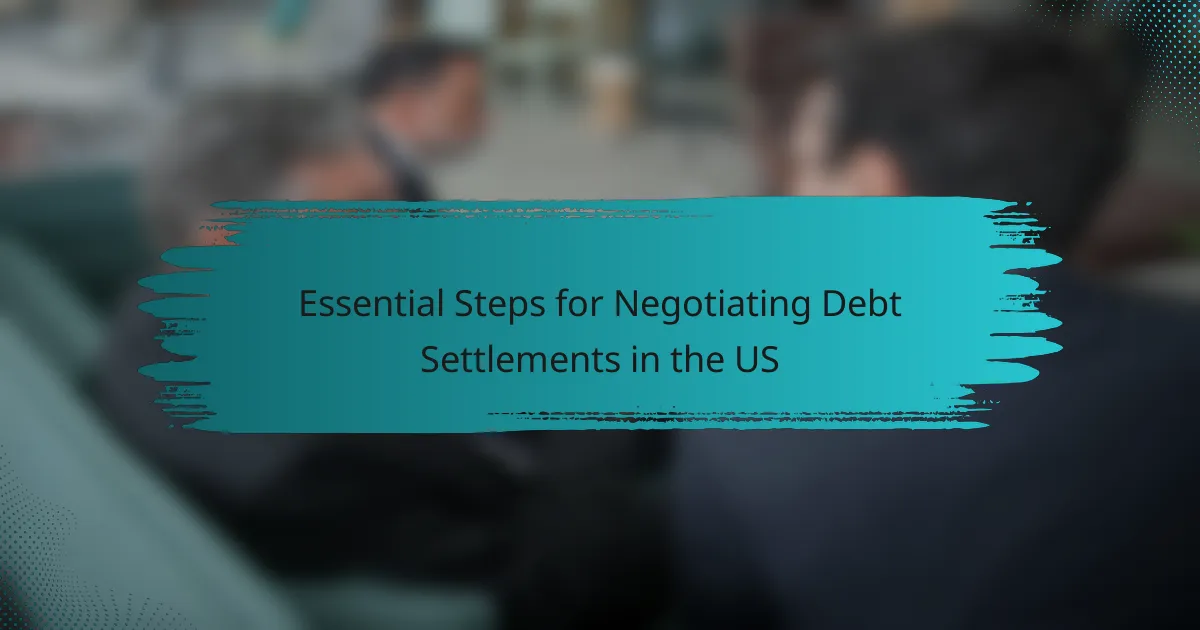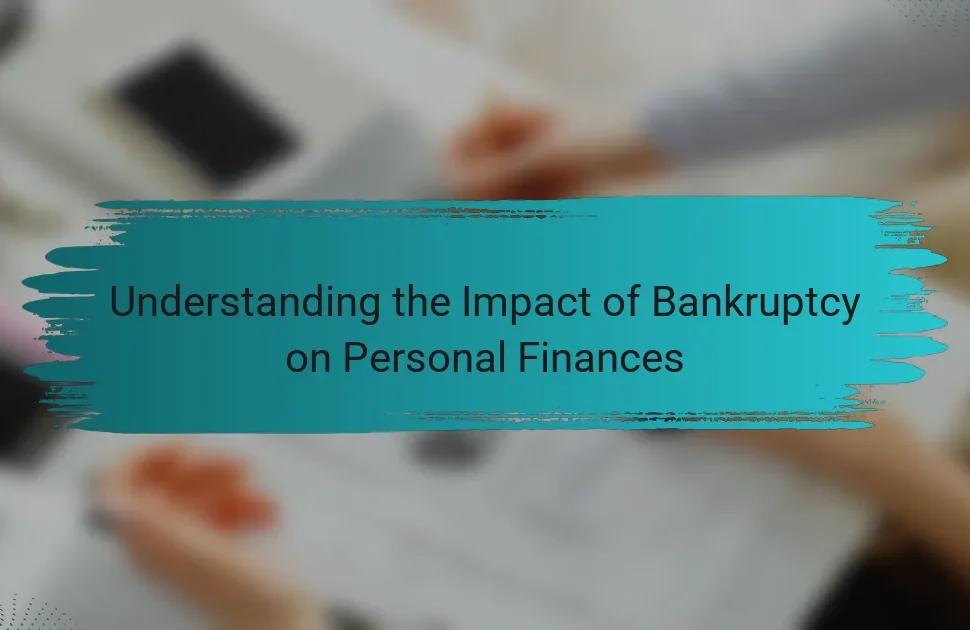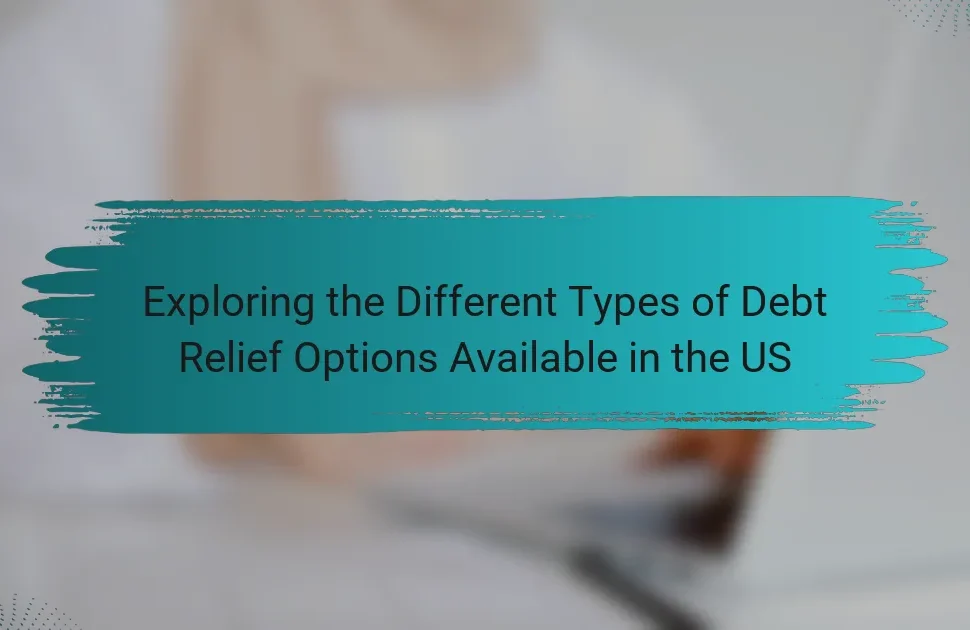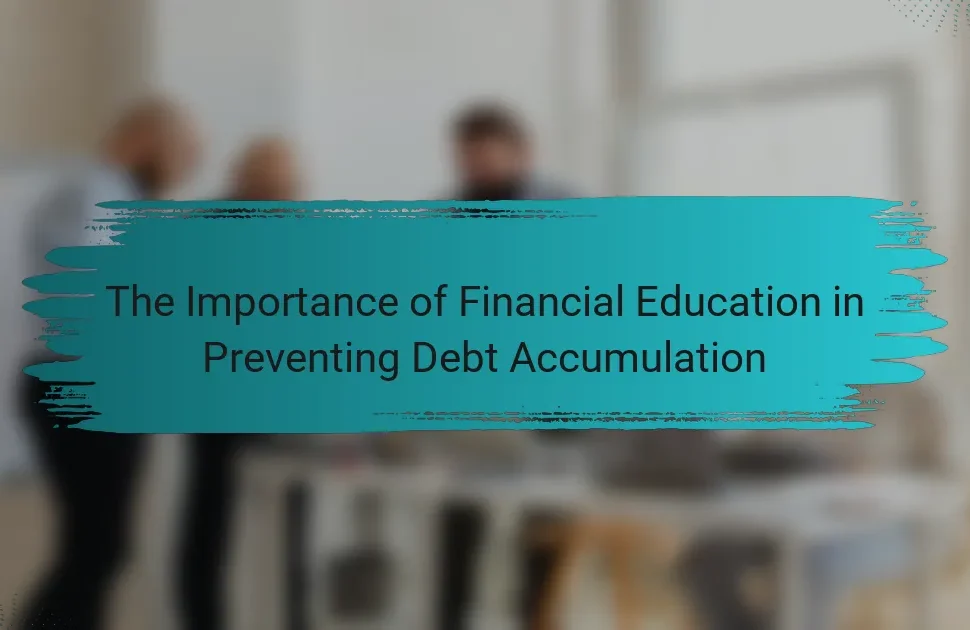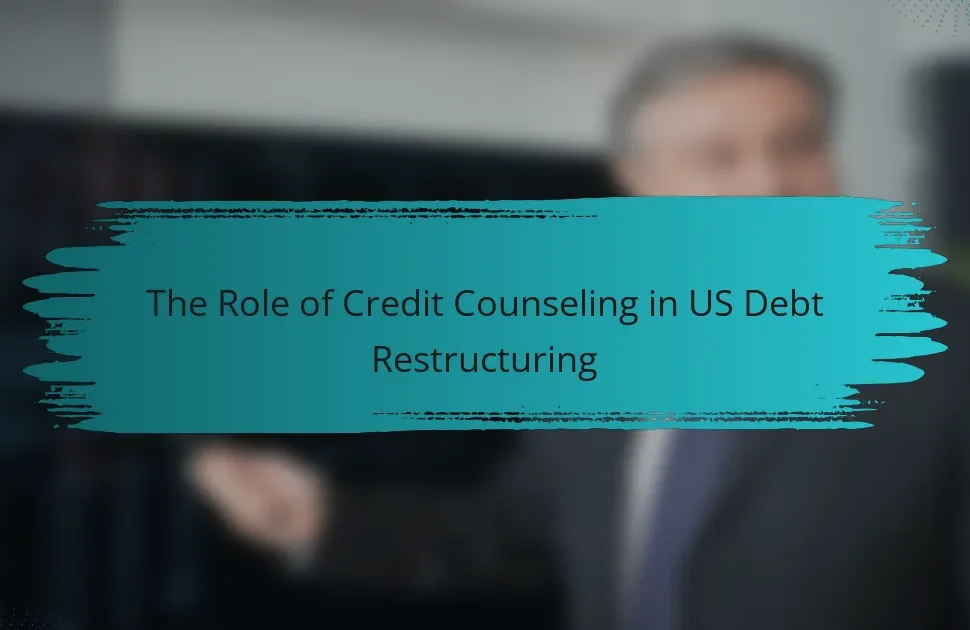Negotiating debt settlements in the US involves several essential steps that can help individuals manage their financial burdens. Key actions include assessing one’s financial situation, determining a negotiation strategy, and contacting creditors to discuss settlement options. It is crucial to review total debts and income, decide whether to negotiate independently or seek professional help, and prepare to explain financial hardships clearly. Establishing a realistic budget and documenting all communications with creditors are vital for effective negotiations. Understanding creditor policies and being persistent can lead to favorable outcomes, as many creditors are willing to accept partial payments rather than receive nothing.
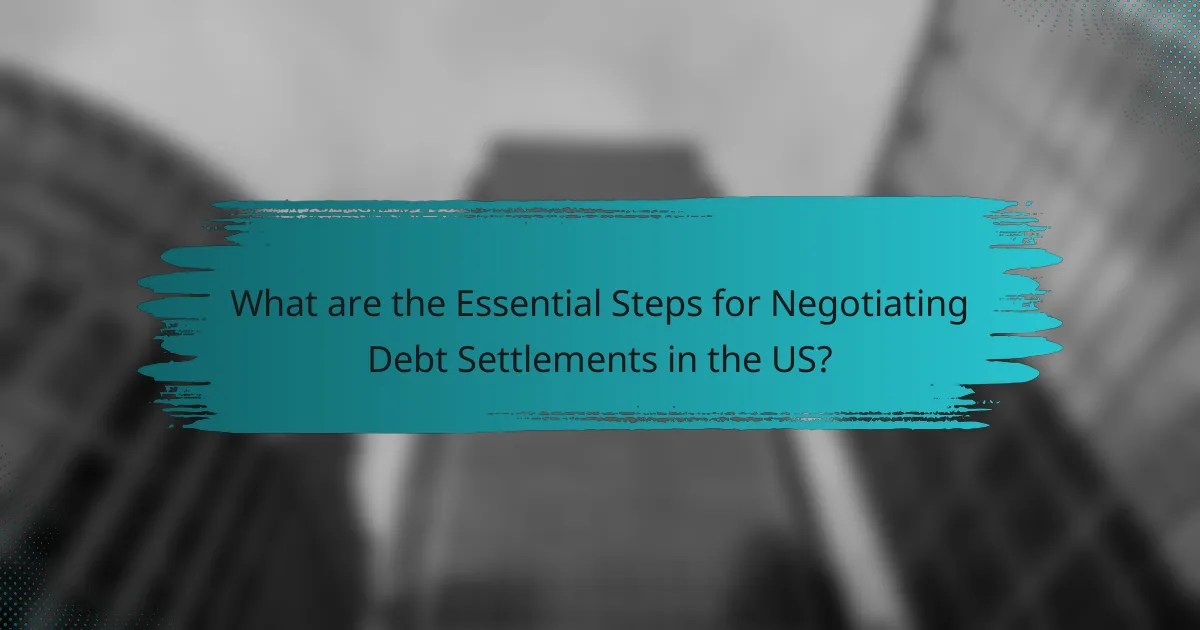
What are the Essential Steps for Negotiating Debt Settlements in the US?
The essential steps for negotiating debt settlements in the US include assessing your financial situation, determining your negotiation strategy, and contacting creditors. Start by reviewing your debts and income to understand your financial standing. Next, decide whether to negotiate on your own or hire a professional. When contacting creditors, be prepared to explain your financial hardship. Offer a settlement amount that is less than the total owed. Be patient and persistent, as negotiations may take time. Document all communications with creditors for reference. Finally, ensure you get any agreement in writing before making payments. These steps can lead to successful debt settlements, as many creditors prefer to receive partial payments rather than nothing at all.
How does the debt settlement process work?
The debt settlement process involves negotiating with creditors to reduce the total amount owed. Initially, a debtor stops making payments to their creditors. This often leads creditors to negotiate a lower settlement amount. The debtor or a debt settlement company then proposes a lump-sum payment that is less than the total debt. Creditors may accept this offer to avoid the cost of collection. Once an agreement is reached, the debtor pays the agreed amount, and the remaining debt is forgiven. This process can take several months to years, depending on the amount owed and the willingness of creditors to negotiate. It is essential to note that settled debts may have tax implications, as forgiven amounts can be considered taxable income.
What are the key stages in negotiating a debt settlement?
The key stages in negotiating a debt settlement include preparation, communication, negotiation, and agreement. Preparation involves assessing financial situations and gathering necessary documentation. Communication requires reaching out to creditors to express the intent to negotiate. Negotiation consists of proposing a settlement amount and discussing terms. Agreement finalizes the settlement in writing, ensuring both parties understand the terms. Each stage is crucial for a successful outcome in debt settlement negotiations.
How long does the debt settlement process typically take?
The debt settlement process typically takes three to six months. This duration can vary based on individual circumstances and the amount of debt involved. Factors such as creditor responsiveness and negotiation effectiveness also play a role. Industry standards suggest that most settlements are reached within this timeframe. Additionally, some cases may extend beyond six months if complications arise.
What are the benefits of negotiating debt settlements?
Negotiating debt settlements can significantly reduce the total amount owed. This often results in paying less than the full balance. It may also lead to more manageable payment terms. Improved cash flow is another benefit, as lower payments can ease financial strain. Successful negotiations can prevent further collection actions. This includes avoiding lawsuits or wage garnishments. Additionally, settling debts can improve credit scores over time. It demonstrates a willingness to resolve financial obligations responsibly.
How can debt settlements impact your credit score?
Debt settlements can significantly lower your credit score. When a debt is settled for less than the full amount owed, it is marked as “settled” on your credit report. This status indicates to lenders that you did not pay the full debt as agreed. Credit scoring models typically view this negatively. The impact can reduce your score by 50 to 150 points, depending on your initial credit score and the amount of debt settled. Settlements can remain on your credit report for up to seven years. This long-term effect can hinder your ability to obtain new credit or loans.
What financial relief can you expect from a successful debt settlement?
A successful debt settlement can lead to significant financial relief by reducing the total amount owed. Typically, debtors can expect to settle their debts for 40% to 60% less than the original balance. This reduction allows individuals to pay off their debts more quickly and with less financial strain. Additionally, settling debts can improve credit scores over time, as accounts marked as settled are often viewed more favorably than those in default. According to a study by the Federal Trade Commission, consumers who settle debts can regain financial stability sooner than those who continue to struggle with payments.
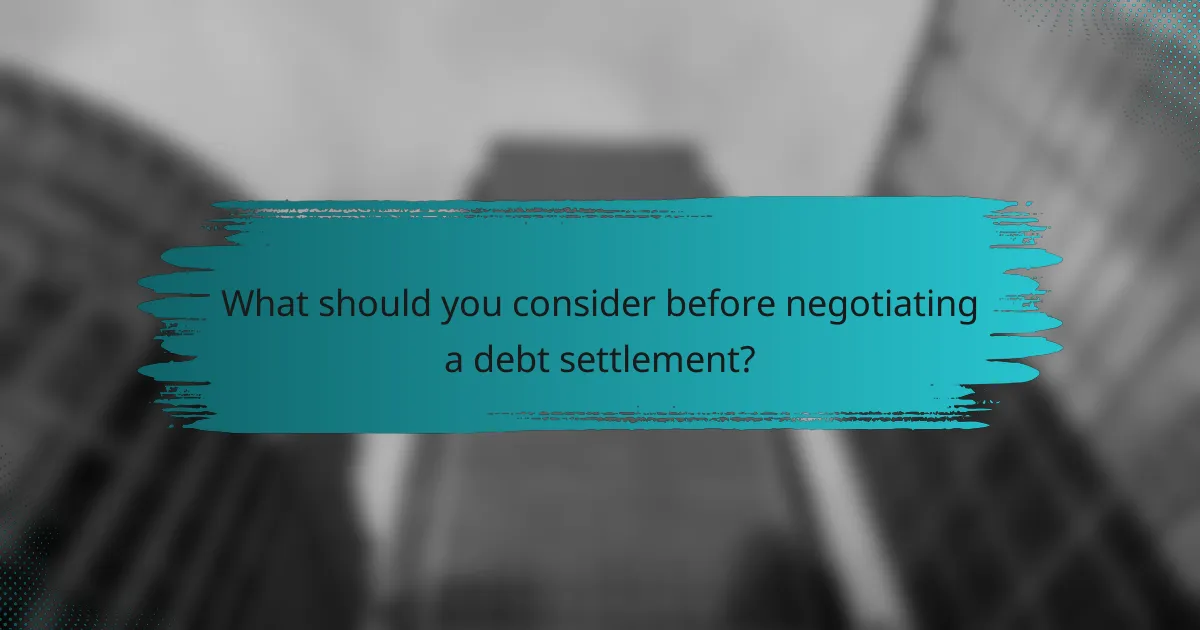
What should you consider before negotiating a debt settlement?
Before negotiating a debt settlement, consider your total debt amount. Assess your ability to make a lump-sum payment. Understand the impact on your credit score. Research your creditor’s policies on settlements. Review your financial situation and budget. Be aware of potential tax implications on forgiven debt. Gather documentation of your debts and communications with creditors. Prepare a clear negotiation strategy to present your offer.
What are the risks involved in debt settlement negotiations?
Debt settlement negotiations carry several risks. One significant risk is the potential for tax implications. The IRS considers forgiven debt as taxable income. Another risk is the possibility of lawsuits from creditors. Creditors may decide to pursue legal action if negotiations fail. Additionally, debt settlement can negatively impact credit scores. Settling debts for less than owed often reflects poorly on credit reports. There is also the risk of incurring additional fees. Some debt settlement companies charge high fees for their services. Lastly, not all debts may be eligible for settlement. Certain types of debt, like student loans, may not be negotiable.
How can debt settlement affect future borrowing capabilities?
Debt settlement can significantly reduce future borrowing capabilities. When a debt is settled, it typically appears on a credit report as “settled” or “paid for less than owed.” This notation can lower a credit score by 100 points or more, depending on the individual’s credit history. A lower credit score indicates higher risk to lenders. Consequently, future loan applications may be denied or result in higher interest rates. Research shows that individuals who settle debts may face challenges obtaining new credit for up to seven years. This duration aligns with the time it takes for negative marks to fade from credit reports. Therefore, debt settlement can have long-lasting effects on an individual’s ability to borrow in the future.
What are the potential tax implications of debt settlements?
Debt settlements can have significant tax implications. When a debt is settled for less than the full amount owed, the forgiven amount may be considered taxable income. The IRS requires individuals to report this forgiven debt on their tax returns. For example, if a borrower owes $10,000 and settles for $6,000, the $4,000 difference is treated as income. This is outlined in IRS Publication 4681, which specifies that taxpayers must include canceled debts in their income unless certain exceptions apply. Exceptions may include insolvency or specific types of loans. Understanding these implications is crucial to avoid unexpected tax liabilities.
What documentation is needed for negotiating a debt settlement?
To negotiate a debt settlement, specific documentation is required. This includes a detailed list of debts, including account numbers and balances. You should also gather proof of income, such as pay stubs or tax returns. Additionally, bank statements can help demonstrate your financial situation. Collect any correspondence from creditors related to the debt. Finally, a personal financial statement outlining assets and liabilities is essential. These documents provide a comprehensive view of your financial status and support your negotiation efforts.
What financial information should you gather before negotiations?
Gathering comprehensive financial information before negotiations is crucial. Key data includes total debt amount, interest rates, and monthly payment obligations. You should also know your income, expenses, and any assets. This information helps assess your financial position and determine negotiation limits. Additionally, understanding your credit score can influence negotiation strategies. Having recent statements from creditors provides insight into your payment history. Researching industry standards for debt settlements can guide expectations. Accurate financial information enables effective negotiation tactics and increases the likelihood of favorable outcomes.
How can you prepare a negotiation proposal?
To prepare a negotiation proposal, identify your objectives clearly. Outline the specific terms you wish to negotiate. Gather relevant financial information to support your position. Create a structured document that presents your case logically. Include a summary of your financial situation and any relevant documentation. Use clear and concise language throughout the proposal. Anticipate counterarguments and prepare responses. A well-prepared proposal increases the likelihood of a successful negotiation outcome.
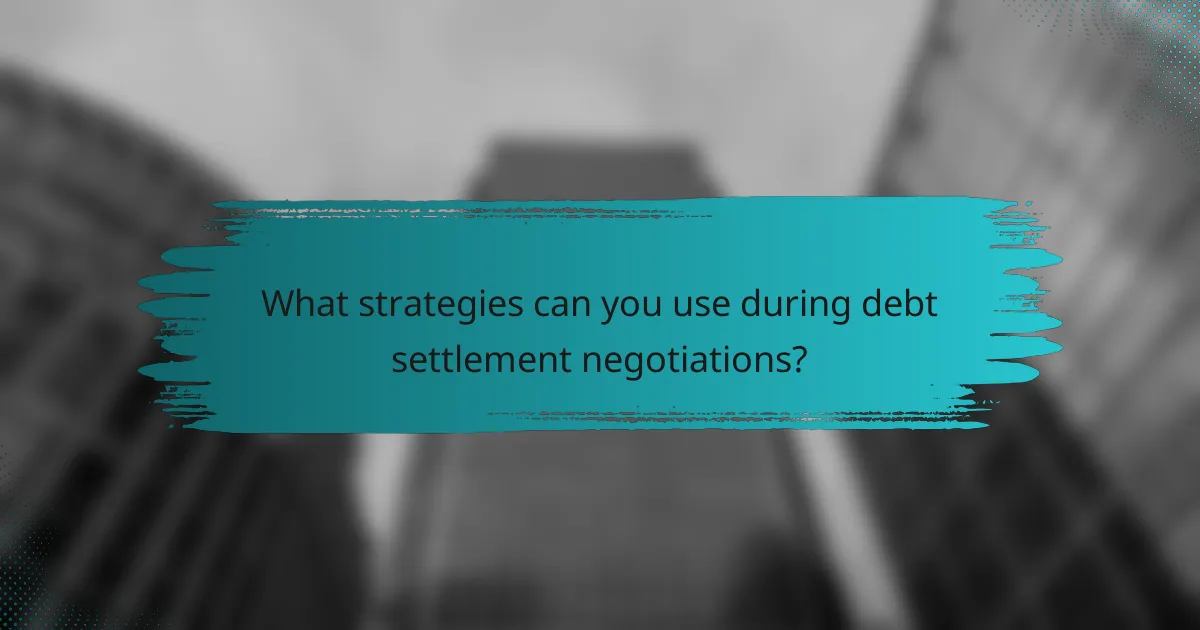
What strategies can you use during debt settlement negotiations?
Use clear communication and establish a realistic budget during debt settlement negotiations. Clearly articulate your financial situation to the creditor. Provide specific details about your income and expenses. This transparency builds trust and helps the creditor understand your position. Establish a budget that outlines what you can realistically afford to pay. Present this budget during negotiations to support your settlement offer. Additionally, research the creditor’s policies and practices. Knowing their typical settlement amounts can strengthen your negotiation strategy. Be prepared to negotiate multiple times. Persistence often leads to better outcomes in debt settlements.
How should you approach your creditors during negotiations?
Approach your creditors with honesty and clarity during negotiations. Start by gathering all relevant information about your debts. This includes the total amount owed, interest rates, and payment history. Present your financial situation transparently to your creditors. Explain your current inability to meet the original terms. Offer a realistic repayment plan or settlement amount. Be prepared to negotiate and listen to their counteroffers. Maintain a respectful and professional tone throughout the discussions. This approach fosters trust and can lead to more favorable outcomes.
What negotiation tactics can increase your chances of success?
Effective negotiation tactics include preparation, active listening, and building rapport. Preparation involves researching the other party’s needs and interests. It helps to identify common ground and potential concessions. Active listening fosters understanding and demonstrates respect for the other party’s perspective. Building rapport can create a more collaborative atmosphere. Studies show that negotiators who establish a positive relationship achieve better outcomes. Additionally, using silence strategically can encourage the other party to fill the gap, often leading to more favorable terms. These tactics enhance communication and increase the likelihood of a successful negotiation outcome.
How can you handle counteroffers from creditors?
To handle counteroffers from creditors, assess the terms carefully. Review the proposed payment amounts and timelines. Compare these with your financial situation. Determine if the counteroffer is manageable within your budget. If the offer is acceptable, respond promptly to confirm your acceptance. If the terms are still unfavorable, counter with a proposal that aligns with your financial capabilities. Document all communications for future reference. Research shows that successful negotiations often involve clear communication and a willingness to compromise.
What common mistakes should you avoid in debt settlement negotiations?
Common mistakes to avoid in debt settlement negotiations include not doing thorough research on your debts. Understanding the total amount owed and the creditor’s policies is crucial. Another mistake is failing to prepare a realistic budget for settlement offers. Being unprepared can lead to unfavorable terms. Additionally, not communicating effectively with creditors can hinder negotiations. Clear and professional dialogue is essential for progress. Ignoring deadlines for responses or settlements can also derail the process. Timeliness is key in negotiations. Lastly, accepting the first offer without negotiation can result in loss of potential savings. Many consumers achieve better terms through persistent negotiation.
How can underestimating your financial situation affect negotiations?
Underestimating your financial situation can lead to unfavorable negotiation outcomes. This miscalculation may result in accepting higher payment terms than necessary. It can also limit your ability to leverage your actual financial capabilities. Negotiators might perceive you as less credible or informed. Consequently, this perception can weaken your bargaining position. Studies indicate that accurate financial assessments lead to more effective negotiation strategies. For instance, the Harvard Negotiation Project emphasizes the importance of understanding one’s financial landscape. Overall, a clear grasp of your financial situation is crucial for successful negotiations.
What role does communication play in successful negotiations?
Communication is crucial for successful negotiations. It facilitates the exchange of information between parties. Effective communication helps clarify interests and positions. It allows negotiators to build rapport and trust. Active listening is essential in understanding the other party’s needs. Clear articulation of one’s own needs fosters mutual understanding. Non-verbal cues also play a significant role in conveying intentions. Research shows that effective communication can improve negotiation outcomes significantly.
What are some best practices for successful debt settlement negotiations?
Successful debt settlement negotiations require thorough preparation and clear communication. Begin by understanding your financial situation and the total debt owed. Gather all relevant documents, including account statements and any correspondence with creditors. Research the creditor’s policies and typical settlement amounts for your specific debt type. Develop a realistic offer based on your financial capacity. Initiate contact with the creditor, presenting your offer confidently and clearly. Be prepared to negotiate and counteroffer, remaining calm and respectful throughout the process. Document all agreements in writing to ensure clarity and protect your interests. Following these practices increases the likelihood of a favorable outcome in debt settlement negotiations.
How can you maintain a positive relationship with creditors during negotiations?
Maintain open communication with creditors during negotiations. Regular updates on your financial situation foster trust. Be honest about your ability to pay. This transparency can lead to more favorable terms. Show appreciation for their willingness to negotiate. Acknowledging their efforts can strengthen relationships. Keep a professional tone in all interactions. This approach minimizes misunderstandings and promotes cooperation. Document all agreements and discussions. This practice ensures clarity and accountability.
What follow-up actions should you take after reaching a settlement?
After reaching a settlement, you should obtain a written agreement detailing the terms. This document serves as proof of the settlement. Next, ensure that the creditor updates your credit report to reflect the settled status. Monitoring your credit report is essential to verify this change. Additionally, keep records of all communications related to the settlement. This includes emails and letters. It’s also advisable to follow up with the creditor to confirm compliance with the settlement terms. Lastly, consider consulting a financial advisor for future debt management strategies.
The main entity of this article is the process of negotiating debt settlements in the US. The article outlines essential steps for effective debt negotiation, including assessing financial situations, determining negotiation strategies, and communicating with creditors. Key stages of the process, such as preparation, negotiation, and finalizing agreements, are discussed, along with potential benefits and risks associated with debt settlements. Additionally, the article highlights the impact of settlements on credit scores, tax implications, and best practices for maintaining positive relationships with creditors throughout the negotiation process.
